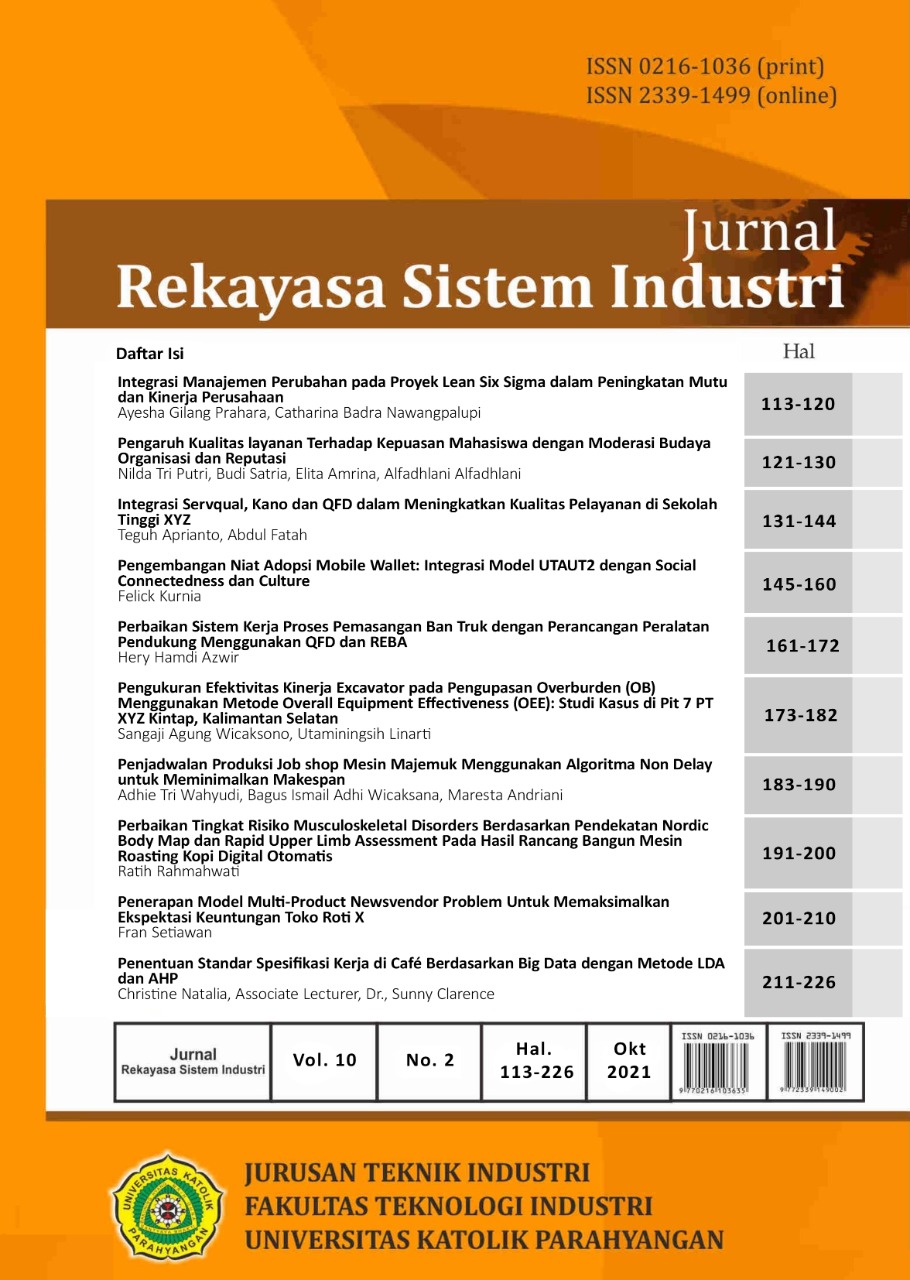Penjadwalan Produksi Job shop Mesin Majemuk Menggunakan Algoritma Non Delay untuk Meminimalkan Makespan
DOI:
https://doi.org/10.26593/jrsi.v10i2.4666.183-190Keywords:
production scheduling, job shop, muti-machines, non – delay algorithmAbstract
Scheduling is an important factor in both manufacturing and service industry environments. Scheduling is a resource allocation arrangement for completing tasks that involve work, resources and time. With the scheduling, all work can be completed according to priority and can minimize processing time, so that makespan is minimal. In addition, it can reduce idle machines and reduce the inventory of semi-finished goods. Maryati Small Micro and Medium Enterprises (IKM) is a business that is engaged in the manufacture of clothing that produces various types of products such as baby clothes, teenage clothes to adults. So far, IKM Maryati is in the process of machine scheduling by determining the order of Job execution based on the longest to shortest total Job processing time. Scheduling with this method creates problems for the company, as evidenced by the accumulation of semi-finished goods at several work-stations. Another problem is when orders arrive at a certain period with a large variety and number of products, causing Job completion that exceeds the target time (due-date). The size of the makespan causes the production time to increase, so the company is late to start production of orders in the following month. In this study, the Non-delay algorithm is used to solve the problems that arise in IKM Maryati. The result obtained is the scheduling using the existing method by IKM Maryati which produces 44 days makespan value. Meanwhile, by applying the Non-delay compound engine algorithm, it produces a makespan of 42 days. This shows that the compound machine Non-delay Algorithm method can minimize the makespan value in IKM Maryati. There is an efficiency of 4.55% in both time and cost variables.
References
Cahyanto, W. N., & Munawir, H., 2016. Penjadwalan Job Shop Mesin Majemuk Menggunakan Algoritma Non Delay Untuk Meminimumkan Mean Flow Time Dan Penentuan Due Date. Universitas Muhammadiyah Surakarta.
Fithri, P., & Ramawinta, F., 2016. Penjadwalan Mesin dengan Menggunakan Algoritma Pembangkitan Jadwal Aktif dan Algoritma Penjadwalan Non-delay Untuk Produk Hydrotiller dan Hammermil Pada CV. Cherry Sarana Argo. J. Optimasi Sitem Ind, 12, 377–399.
Ginting, R., 2009. Penjadwalan Mesin (1st ed.). Graha Ilmu: Yogyakarta.
Harto, S., Garside, A.K., & Utama, D.M., 2016. Penjadwalan Produksi Menggunakan Algoritma Jadwal Non Delay Untuk Meminimalkan makespan Studi Kasus di CV. Bima Mebel. Spektrum Ind., 14. https://doi.org/http://dx.doi.org/10.12928/si.v14i1.3706.
Khoiroh, S.M., 2018. Pengembangan Algoritma Non Delay Pada Kasus Penjadwalan Non-Permutation Hybrid Flow shop Untuk Meminimalisasi Mean Flow time. J. Tek. Ind, 19, 148–156. https://doi.org/https://doi.org/10.22219/JTIUMM.Vol19.No2.148-156.
Nasution, R., Garside, A.K., & Utama, D.M., 2017. Penjadwalan Job Shop Dengan Pendekatan Algoritma Artificial Immune System. J. Tek. Ind, 18, 29–42.
Ong, J.O., 2013. Penjadwalan Non-delay Melalui Mesin Majemuk Untuk Meminimumkan makespan. Spektrum Ind., 11, 185–195. https://doi.org/http://dx.doi.org/10.12928/si.v11i2.1661
Ong, J.O., & Juliyanti, D., 2013. Pengembangan Model Penjadwalan Mesin Majemuk Melalui Job Sisipan. Prosiding Industrial Engineering National Conference (IENACO). Jurusan Teknik Industri Universitas Muhammadiyah Surakarta, Surakarta.
Tampubolon, F.R., 2018. Penggunaan Algoritma Genetika pada Persoalan Multiobjective Flexible Job Shop Scheduling. Universitas Sumatera Utara.

